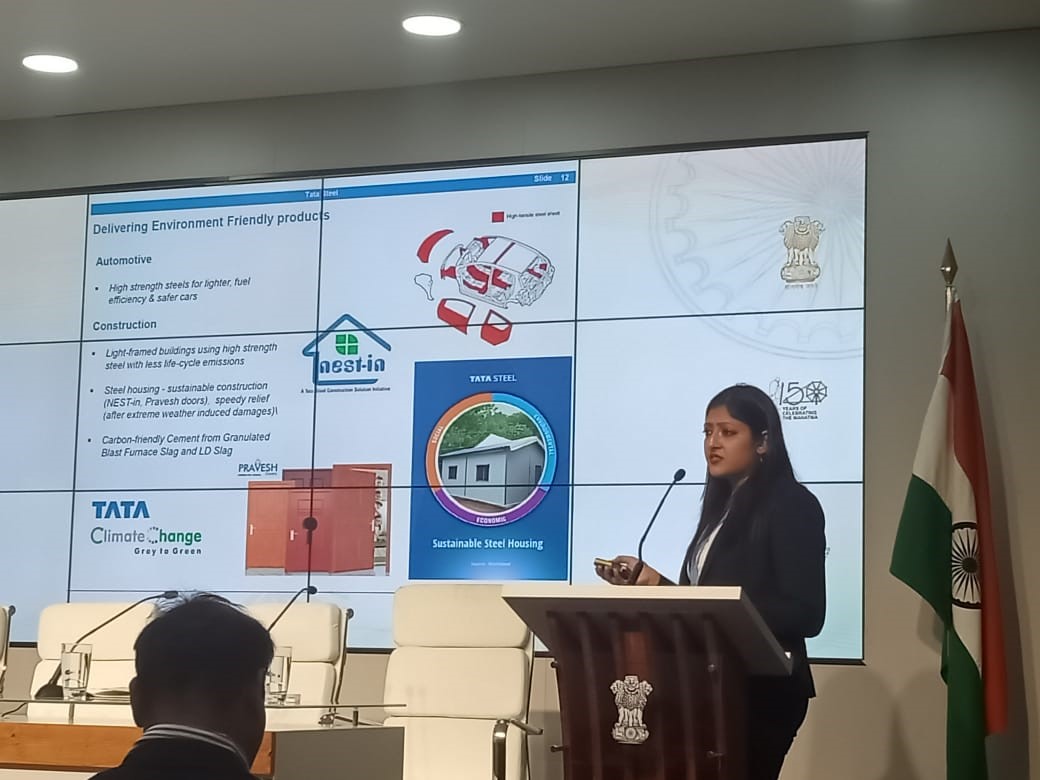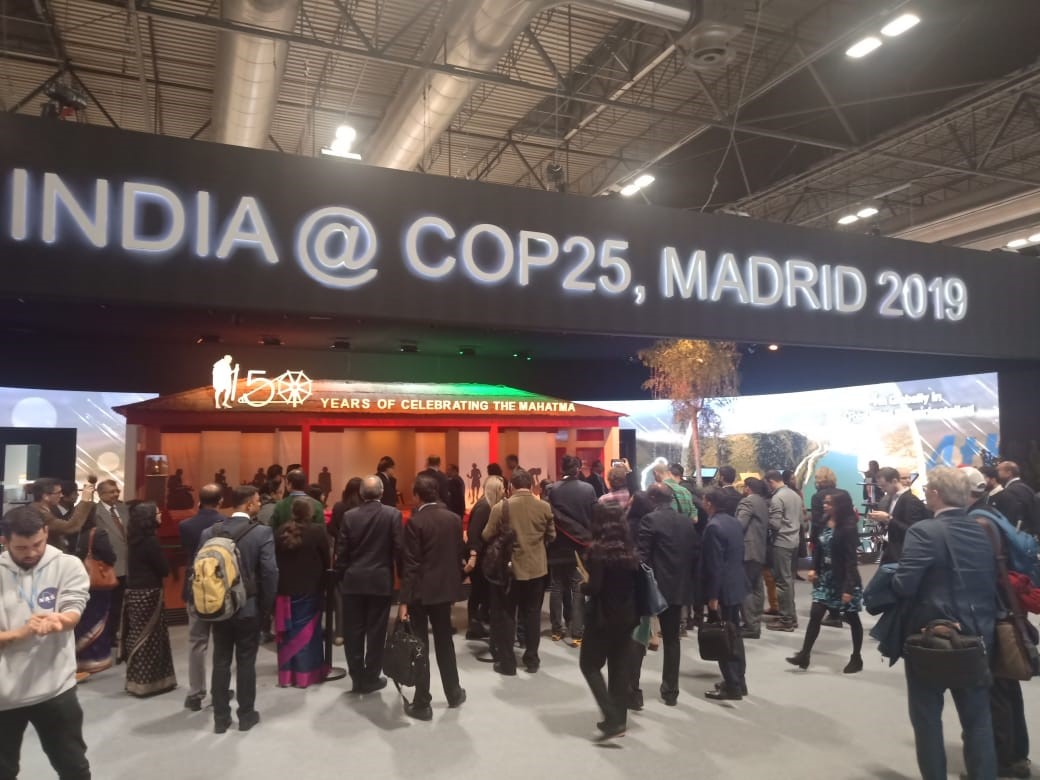Tata Steel’s ‘The Green School Project’ made its presence at the UN Climate Change Conference (COP25) for the second year in a row

~ ‘Green Education: Joining hands to address Climate Change’ theme discussed at COP25, Madrid ~
The Green School Project, an initiative by Tata Steel in association with TERI to spread awareness about environment issues in school campuses, made its presence at the United Nations Climate Change Conference for the second year in a row.
The 25th meeting of Conference of Parties (COP25) to the United Nations Framework Convention on Climate Change (UNFCCC) is ongoing in Madrid, Spain.
A session on ‘Green Education: joining hands to address Climate Change’ was hosted by Tata Steel in association with TERI on 3rd December at the India Pavilion at COP25, Madrid. The keynote address was delivered by Mr C K Mishra, Secretary, Ministry of Environment, Forests and Climate Change, Government of India.
This was followed by a talk by Mr Saurabh Bharadwaj, Fellow & Area Convener, Earth Science and Climate Change, TERI. He apprised the audience on India’s climate change vulnerability and shared his analysis on climate risk modelling. He emphasized on leveraging the power of youth in India to take impactful action in the sphere of environmental protection.

A plenary session on ‘Sustainability Insights: Corporate Learnings’ was also held where Ms Aparajita Agarwal, Sr. Manager, Regulatory Affairs, Tata Steel, also participated. Ms Agarwal spoke about the sustainable practices adopted by Tata Steel to abate emissions. She highlighted that sustainability is integral to Tata Steel’s ethos and value systems. Ms Agarwal also spoke about Tata Steel’s SDG initiatives, and the Company’s efforts to test new groundbreaking technologies to reduce emissions.
The platform showcased ‘The Green School’ project, a joint initiative of Tata Steel and TERI which promotes environmental stewardship to enhance critical and interdisciplinary thinking through formal and informal modes of teaching. This project is being implemented in 34 schools across operational areas of Tata Steel in Jharkhand and Odisha.
““The role of responsible corporate citizens in spearheading the transition to a sustainable economy is very vital. Addressing climate change is everyone’s responsibility and we all need to join hands to make our earth greener and better. Our Green School Project is a unique initiative in that direction,” said Mr. Pankaj Satija, Chief, Regulatory Affairs, Tata Steel.
Ms Neha, Fellow TERI, spoke on ‘Beyond Textbooks, Creating Awareness about Climate Change’ wherein she focused on the importance of using informal methods of teaching to spread the message of a green future. She shared the project learnings, achievements and way forward on creating a template to replicate the project at the national and international level using green curriculum and distinct pedagogy. The attitudinal and behavioral changes brought about by the project were also presented.
A handbook developed as a part of the Green School project, enlisting the gaps in the school green curricula was shared with the Ministry of Environment, Forest and Climate Change to consider for implementation at the national level. A short movie on the ‘Green School’ project was also screened at the end of the event. The project was well received by government officials, academia and event participants – all of whom recognized the immediate necessity of focusing on green education and joining hands to address the climate change challenge.
About Tata Steel
Tata Steel Group is among the top global steel companies with an annual crude steel capacity of 33 million tonnes per annum. It is one of the world's most geographically-diversified steel producers, with operations and commercial presence across the world. The group (excluding SEA operations) recorded a consolidated turnover of US $22.67 billion in the financial year ending March 31, 2019. In 2018, Tata Steel acquired Bhushan Steel Ltd (now renamed as Tata Steel BSL Ltd).
A Great Place to Work-Certified organisation, Tata Steel Ltd., together with its subsidiaries, associates and joint ventures, is spread across five continents with an employee base of over 65,000. Tata Steel retained the ‘Global Steel Industry Leader’ position in the DJSI 2018. The Company has been recognised as the Climate Disclosure Leader in ‘Steel category’ by CDP (2017). Besides being a member of the World Steel Climate Action Programme, Tata Steel has won several awards including the Lighthouse recognition for its Kalinganagar Plant – a first in India, Prime Minister’s Trophy for the best performing integrated steel plant for 2016-17, ‘GreenPro’ certification for products (Tata Pravesh Steel Doors, Tata Structura, Tata Pipes) by CII, Authorized Economic Operator (AEO) status (Tier 2) by the Directorate of International Customs (Ministry of Finance, Govt. of India), ‘Corporate Strategy Award’ by Mint (2018), Golden Peacock Award for Risk Management (2018) and Best Risk Management Framework & Systems Award (2019) by CNBC TV18. The Company also received the ‘Most Ethical Company’ award from Ethisphere Institute for the eight time (2019), Steel Sustainability Champion (2018) by the World Steel Association, Dun & Bradstreet Corporate Awards (2019), Golden Peacock HR Excellence Award by Institute of Directors (2018), ‘Best Companies To Work For’ recognition by Business Today, 'Asia's Best Integrated Report' award by the Asia Sustainability Reporting Awards (2017), among several others.
Last year, the Company launched a corporate brand campaign #WeAlsoMakeTomorrow.
To know more, visit www.tatasteel.com | Follow us on ![]()
![]()
![]()
![]()
![]()
Disclaimer:
Statements in this press release describing the Company’s performance may be “forward looking statements” within the meaning of applicable securities laws and regulations. Actual results may differ materially from those directly or indirectly expressed, inferred or implied. Important factors that could make a difference to the Company’s operations include, among others, economic conditions affecting demand/supply and price conditions in the domestic and overseas markets in which the Company operates, changes in or due to the environment, Government regulations, laws, statutes, judicial pronouncements and/or other incidental factors.









